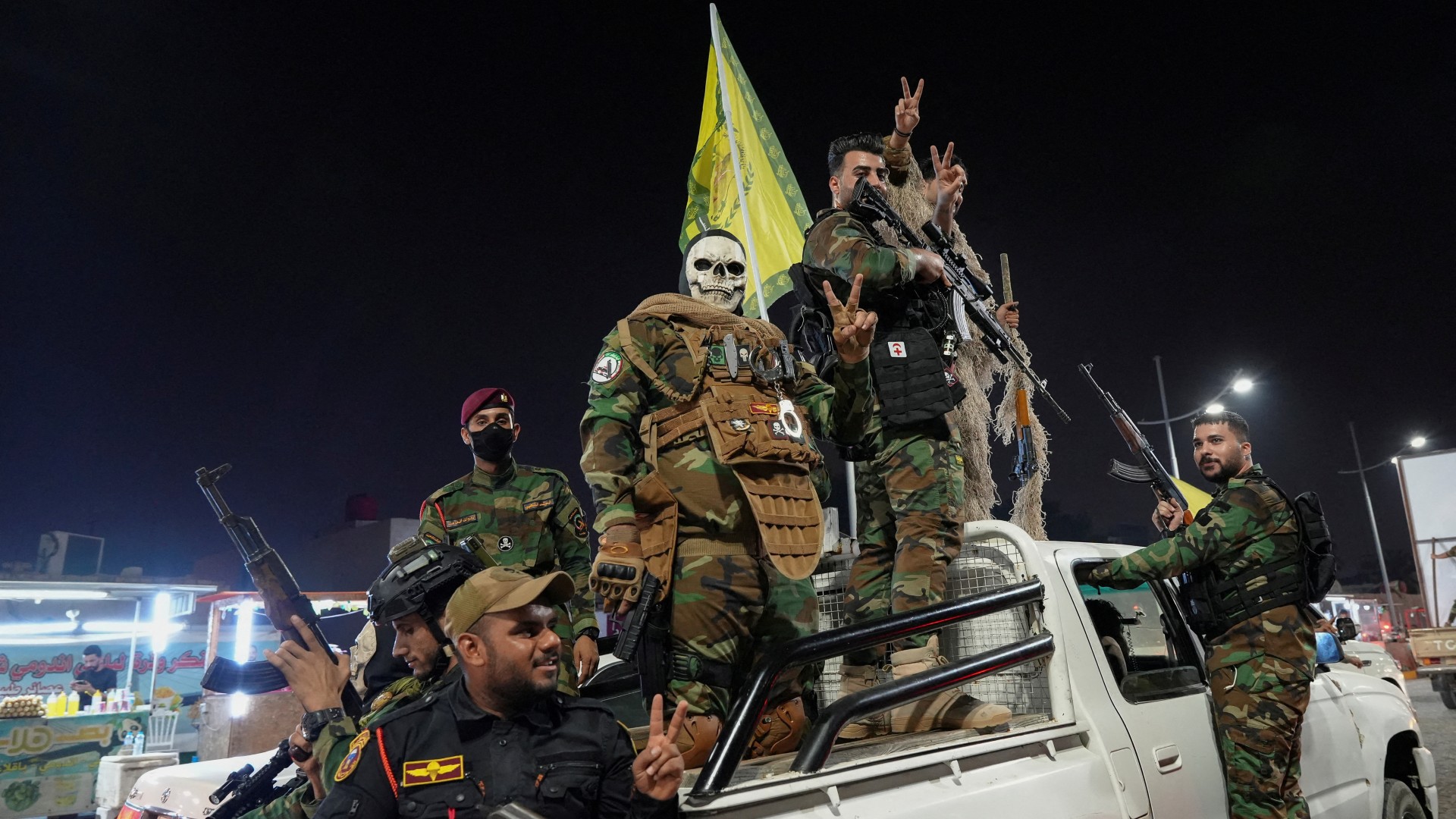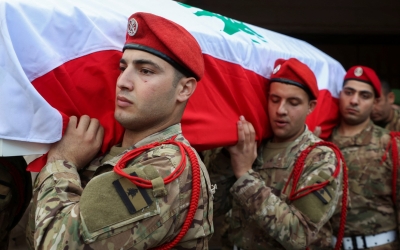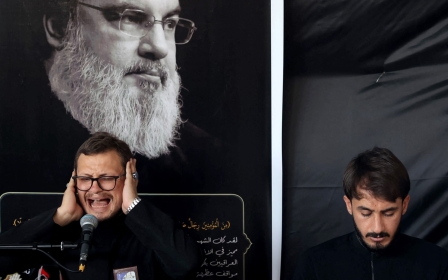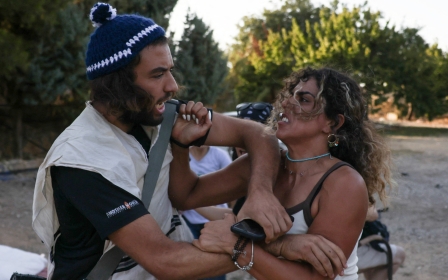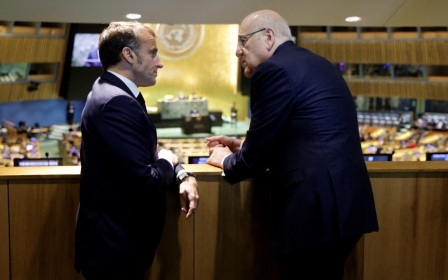Exclusive: Iraqi groups say Israel fabricated deadly Golan drone attack
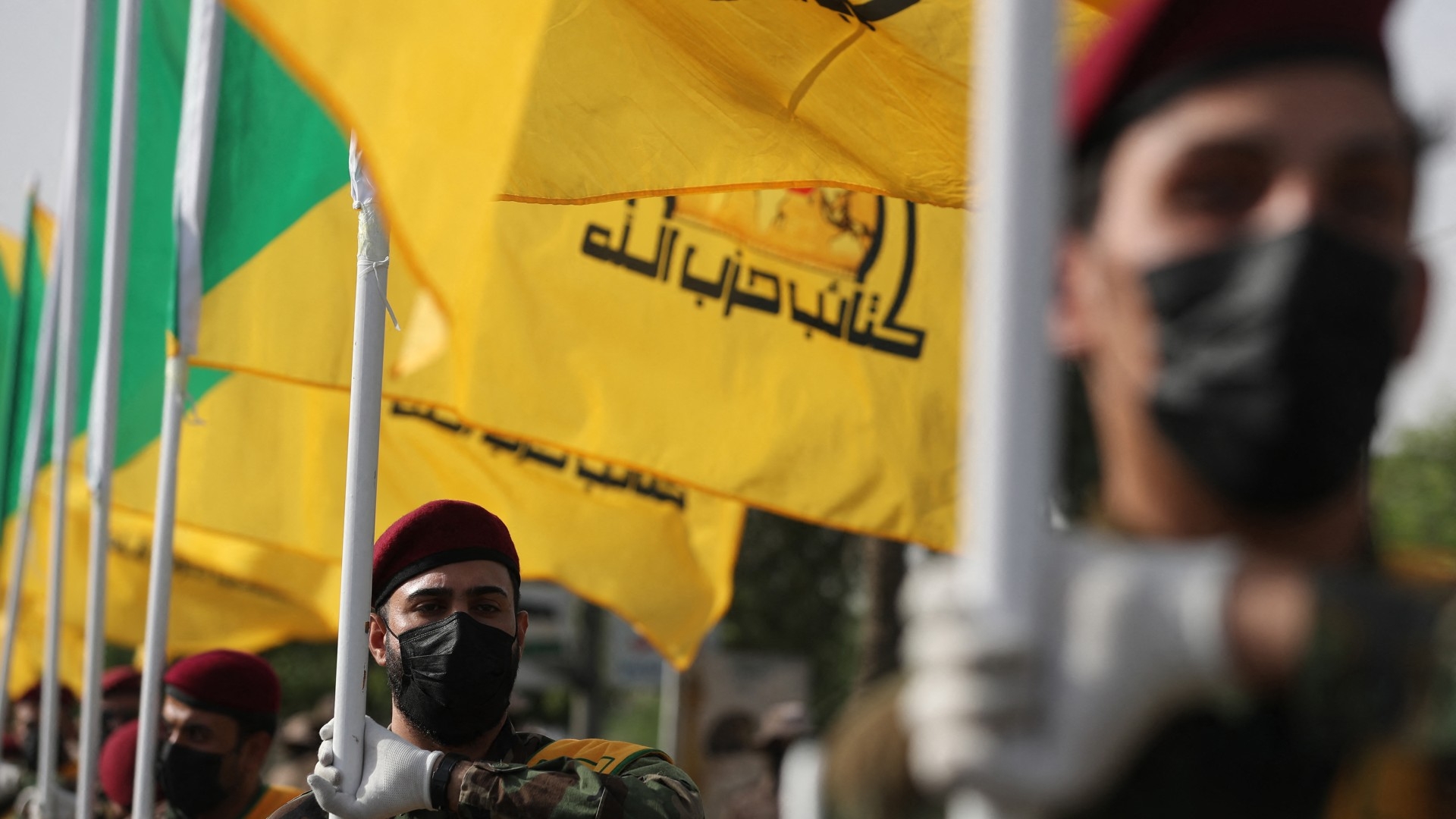
Israel’s claim that two of its soldiers in the occupied Golan Heights were killed by an Iraqi drone attack on Thursday is a fabrication, leaders of armed factions and officials from Iraq told Middle East Eye.
Iraqi political and armed forces decided last week to distance themselves from the battles between Israel and Lebanon’s Hezbollah and focus their efforts on providing humanitarian and financial support to people affected by Israeli attacks in Lebanon and Palestine.
However, Kataeb Hezbollah and Harakat Hezbollah al-Nujaba, two Iraqi armed groups in “the Islamic Resistance in Iraq” alliance, have continued to carry out regular attacks targeting various areas deep inside Israel, as well as the Golan Heights, commanders told MEE.
Kataeb Sayyid al-Shuhada, a smaller faction, provides the necessary support for the operations whenever needed.
On Friday, the Israeli military said two explosive-laden drones had targeted its forces in the Golan early the previous morning. Two officers from the Golani Brigade’s 13th Battalion were killed, it said, and 24 other soldiers were wounded.
New MEE newsletter: Jerusalem Dispatch
Sign up to get the latest insights and analysis on Israel-Palestine, alongside Turkey Unpacked and other MEE newsletters
According to Israel, the first drone was intercepted, but the second detonated before the soldiers could take cover. It said an Iranian-backed Iraqi armed faction was responsible and the drones were launched from Iraq.
Yet, the leaders of the three factions that are continuing to target Israel, as well as Iraqi officials, challenged the Israeli account and said they did not strike the Golan that day.
“Since October of last year, the Islamic Resistance in Iraq has carried out more than 160 operations targeting the Israeli interior and the occupied areas in the Golan Heights, most of which Israel has not acknowledged for various reasons,” Kadhim al-Fartousi, a leader of Kataeb Sayyid al-Shuhadaa and the group’s spokesman, told MEE.
“The resistance announces the operations it carries out as soon as they happen. The resistance did not announce this operation or claim responsibility for it as was reported,” he added.
“If we had carried it out, we would have announced it.”
A senior official in the Popular Mobilisation Authority - the government umbrella that oversees Iraqi armed factions, including those backed by Iran - told MEE that a meeting was convened on Friday following the Israeli allegations.
It included representatives of Kataeb Hezbollah, Harakat Hezbollah al-Nujaba and Kataeb Sayyid al-Shuhada and sought to find out the truth behind the Golan strike claim.
The three factions denied carrying out the operation, the official said.
“The only Iraqi armed faction capable of carrying out such an operation is Kataeb Hezbollah, and they have explicitly said they have nothing to do with the operation and were not behind it,” the official, who attended the meeting, told MEE.
“Our analysis is that the operation was either fabricated, which is likely for several reasons, or that another armed faction, other than the three known factions, carried out the operation from outside Iraqi territory.”
Repeated attacks but elsewhere
An Israeli strike on Iran is expected imminently.
On Tuesday, Iran fired a barrage of ballistic missiles at Israeli military bases, with satellite images showing they caused significant damage.
Iran said the attack was a response to the Israeli killing of Hamas leader Ismail Haniyeh in Tehran and Hezbollah Secretary General Hassan Nasrallah in Beirut, as well as a senior Iranian general also slain in the Lebanese capital.
Despite warnings not to retaliate, Israel said it will soon respond.
Iraqi officials believe Israel is promoting the idea that an Iraqi faction killed the soldiers to lay the groundwork for an attack on Iranian-linked targets in Iraq.
'If we had carried it out, we would have announced it'
- Kadhim al-Fartousi, Kataeb Sayyid al-Shuhadaa
They also think it downplays the fierce resistance Israeli forces are facing from Hezbollah as Israel invades southern Lebanon.
According to a Middle East Eye analysis of statements by Iraqi factions and the Israeli military, as well as open-source evidence, armed groups from Iraq have carried out 45 attacks since mid-September using drones and cruise missiles.
Most of these attacks targeted areas in the “north of the occupied territories” and the “south of the occupied territories”, as the factions phrased it, including Haifa, the Jordan Valley, the Golan Heights, Eilat and central Israel.
Only one attack was described as targeting a “Golani Brigade observation base” on 23 September, but the factions did not specify where that was.
It is clear that the “Islamic Resistance” distinguishes between the Golan, an occupied part of Syria north of Israel, and what it describes as the “south of the occupied territories”, by which it means southern Israel.
The alliance’s statement on 3 October detailing its attacks suggests that the only operation it carried out that day was targeting a site “south of the occupied territories” and it was in the evening.
Hezbollah's success on the ground
Israel and Hezbollah have been trading blows since the Lebanese movement began firing rockets over the border in October of last year in solidarity with Palestinians under attack in Gaza.
Over the past three weeks, Israel has massively escalated the conflict, pummeling Lebanon with air strikes, killing Nasrallah and other Hezbollah leaders and displacing 1.2 million Lebanese.
More than 2,000 people in Lebanon have been killed in the past year, the majority in recent weeks.
At dawn on Tuesday, the Israeli military announced that its troops had entered Lebanon.
Hezbollah’s resistance on the ground has since been fierce and forced Israel to send additional military reinforcements.
Soldiers from the Golani Brigade were among the troops sent into battle in the villages of south Lebanon and participated in the most bloody clashes over the first three days in Maroun al-Ras, Yaroun and Aitaroun.
According to Hezbollah, the movement has ambushed Israeli troops with explosive devices and destroyed three Merkava tanks with guided missiles.
Video footage circulating online shows several serious Hezbollah attacks and Israeli casualties.
So far, Israel has announced the death of nine soldiers, who it said were killed in Lebanon on Tuesday and Wednesday, including two from the Golani Brigade.
However, the only deaths reported on Thursday are the two soldiers allegedly killed by the purported Iraqi drone attack in the Golan.
An adviser to Iraqi Prime Minister Mohammed Shia al-Sudani told MEE that “as a government, we do not comment on activities that took place outside Iraq” but did not deny that the Israeli claim was concerning.
“We do not know where the operation took place or how, and we have no control over what is happening outside Iraq,” the adviser said.
“The Israelis and everyone know the official position of the Iraqi government. We are against expanding the conflict between Hezbollah and Israel, and our efforts are focused on diplomatic efforts to prevent the region from sliding into a full-scale war.”
Middle East Eye delivers independent and unrivalled coverage and analysis of the Middle East, North Africa and beyond. To learn more about republishing this content and the associated fees, please fill out this form. More about MEE can be found here.


